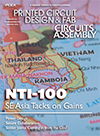News
ST. LOUIS -- Northrop Grumman awarded LaBarge Inc. a $3.5 million contract to continue to produce electronics equipment for the AN/AAQ-24(V) NEMESIS Directional Infrared Countermeasure (DIRCM) system. LaBarge has worked on the program for nearly a decade.
Production at LaBarge's Tulsa, OK., facility is expected to begin in
April and continue through June, the EMS company said.
He will report to Jeffrey Gill, president and chief executive of Sypris Solutions.
TAIPEI -- Qisda Corp., the company formerly known as BenQ, is preparing to sell a rougly 13% stake of the company to a private equity investor for about $164 million.
The deal is close to being done, a company spokeswoman said over the weekend, but details on the investor were not provided.
“Traditional consumer electronics devices continue to be led by the conversion from analog to digital television,” said Brian O’Rourke, In-Stat analyst. “PCs will maintain their strong growth pattern with a compound annual growth rate of 9.7% through 2011, with growth being driven by increased sales in Africa, the Middle East, South America, and Asia/Pacific regions.”
In-Stat found:
- India and China are driving the mobile phone handset segment, as low-cost handsets have been developed to meet the market requirements in less developed countries.
- Asia/Pacific and Rest-of-World (including Africa, the Middle East and South America) regions will lead in overall annual growth rates.
- PCs shipments will be driven by a continued transition from desktop to mobile units.
VS Acquisition Holding Inc. will be a wholly owned business unit of ITW and part of the company's existing power systems and electronics businesses, ITW said in a press release, and will operate as a separate business under the Vitronics Soltec name.
Tessera said it was notified orally of the decision, and that a written notice should be available soon.
That's a tick higher than the 11.71% CAGR China posted from 2002 to 2006.
Yet in a twist, the success of IP for RF and wireless applications has indirectly contributed to slower growth for the semiconductor design IP sector overall, says a new report.
Research firm Strategy Analytics claims, “Getting even a fraction of the IP cores on offer by more than 90 firms to work together, especially in SoCs for wireless devices, is a difficult challenge, but one made easier if done under one roof.”
Under terms of the agreement, EI maintains control of design and technical support for CoreEZ. Unimicron will manufacture substrates at one of its Taiwanese facilities.
The two companies will handle sales jointly.
The Blue Man Group stage show combines percussion-driven music, flashy special effects and instruments made from plastic piping into a visual extravaganza.
All trade show visitors are invited to leave a business card at the company's booth (1439) for the drawing. Winners must be present to claim the tickets.
The optical networking, switching and routing, and cable TV segments were each up at least 19%, and the DSLAM segment managed a 3% gain.
Wireline service provider capex was $32.6 billion, up 15.1% year-over-year; optical networking segment revenues were $4.4 billion, up 30.4%; switching and routing segment revenues were $3 billion, up 19%; cable TV equipment segment revenues were $850 million, up 24.4%, and broadband equipment revenues were $1.1 billion, down 4.2% year-over-year.
“Fears that service providers would reduce spending preemptively due to recession worries proved unfounded,” said John Lively, vice president, network infrastructure at Ovum. “Global spending on wireline equipment grew by nearly 9% in the fourth quarter of 2007, as service providers like AT&T, Comcast, KDDI, KPN, Swisscom and TeliaSonera continued to invest in network capabilities in support of new services. ”
Press Releases
- Innominds and SIIX launch SIIX-Innominds JV to offer full-stack ODM services in India
- Syrma SGS Technology, Ltd to Accelerate AI-Driven Manufacturing with implementation of analytics and AI solution from Arch Systems in partnership with NMTronics India
- TTCI and The Training Connection Strengthen Electronics Manufacturing with Test Services and Training at PCB West 2025
- SMTA “Members of Distinction” Awards Announced


